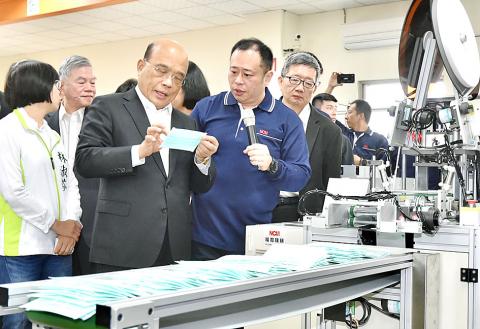Due to added production lines, the nation is poised to become second in the world in terms of mask production at the end of this month or early next month, Premier Su Tseng-chang (蘇貞昌) said yesterday.
Su made the remarks while inspecting mask manufacturing facilities at Nonwoven Converting Machinery Co (權和機械) in New Taipei City.
Thanks to the efforts of the Ministry of Economic Affairs, the nation is set to finish adding 60 mask production lines to its current production capacity at the end of this month or early next month, Su said.

Photo: Tu Chien-jung, Taipei Times
By then, the nation would be able to produce about 10 million masks per day, he said.
Nine of the production lines would launch today, he added.
Disease prevention is a joint effort, Su said, thanking the company and the Taiwan Machine Tool and Accessory Builders’ Association for helping to boost mask production amid an outbreak of COVID-19 in China.
He also thanked pharmacists for cooperating with the government’s mask rationing policy and for maintaining order when people line up to buy masks, as well as postal workers for delivering masks to every corner of the nation.
All of these efforts have enabled prices to be capped at an affordable NT$5 per mask and kept the number of confirmed cases low, compared with neighboring countries, Su said, adding that the nation’s tenacity has shone through under such harsh conditions.
Asked whether a planned budget for an Executive Yuan program to give people shopping coupons would be sufficient to boost sales after the outbreak is brought under control, Su said that he would ask Executive Yuan Secretary-General Li Meng-yen (李孟諺) and Minister Without Portfolio Kung Ming-hsin (龔明鑫) to determine whether to increase the budget for the coupons or expand their scope.
For example, aside from markets and stores, the coupons could be made redeemable at concert and exhibition venues, whose business has also suffered from the outbreak, he said.
The Ministry of Economic Affairs has proposed a tentative budget of NT$2 billion (US$66.6 million) for the coupons, which would translate to each citizen receiving between NT$100 and NT$200 in discounts.

Tropical Storm Gaemi strengthened into a typhoon at 2pm yesterday, and could make landfall in Yilan County tomorrow, the Central Weather Administration (CWA) said yesterday. The agency was scheduled to issue a sea warning at 11:30pm yesterday, and could issue a land warning later today. Gaemi was moving north-northwest at 4kph, carrying maximum sustained winds near its center of up to 118.8kph and gusts of 154.8kph. The circumference is forecast to reach eastern Taiwan tomorrow morning, with the center making landfall in Yilan County later that night before departing from the north coast, CWA weather forecaster Kuan Shin-ping (官欣平) said yesterday. Uncertainty remains and

SEA WARNING LIKELY: The storm, named Gaemi, could become a moderate typhoon on Wednesday or Thursday, with the Taipei City Government preparing for flooding A tropical depression east of the Philippines developed into a tropical storm named Gaemi at 2pm yesterday, and was moving toward eastern Taiwan, the Central Weather Administration (CWA) said. Gaemi could begin to affect Taiwan proper on Tuesday, lasting until Friday, and could develop into a moderate typhoon on Wednesday or Thursday, it said. A sea warning for Gaemi could be issued as early as Tuesday morning, it added. Gaemi, the third tropical storm in the Pacific Ocean this typhoon season, is projected to begin moving northwest today, and be closest to Taiwan on Wednesday or Thursday, the agency said. Today, there would likely

DISRUPTIONS: The high-speed rail is to operate as normal, while several airlines either canceled flights or announced early departures or late arrivals Schools and offices in 15 cities and counties are to be closed today due to Typhoon Gaemi, local governments announced last night. The 15 are: Taipei, New Taipei City, Taoyuan, Tainan, Keelung, Hsinchu and Kaohsiung, as well as Yilan, Hualien, Hsinchu, Miaoli, Chiayi, Pingtung, Penghu and Lienchiang counties. People should brace for torrential rainfall brought by the storm, with its center forecast to make landfall on the east coast between tonight and tomorrow morning, the Central Weather Administration (CWA) said. The agency issued a sea warning for the typhoon at 11:30pm on Monday, followed by a land warning at 11:30am yesterday. As of

CASUALTY: A 70-year-old woman was killed by a falling tree in Kaohsiung as the premier warned all government agencies to remain on high alert for the next 24 hours Schools and offices nationwide are to be closed for a second day today as Typhoon Gaemi crosses over the nation, bringing torrential rain and whipping winds. Gaemi was forecast to make landfall late last night. From Tuesday night, its outer band brought substantial rainfall and strong winds to the nation. As of 6:15pm last night, the typhoon’s center was 20km southeast of Hualien County, Central Weather Administration (CWA) data showed. It was moving at 19kph and had a radius of 250km. As of 3pm yesterday, one woman had died, while 58 people were injured, the Central Emergency Operation Center said. The 70-year-old